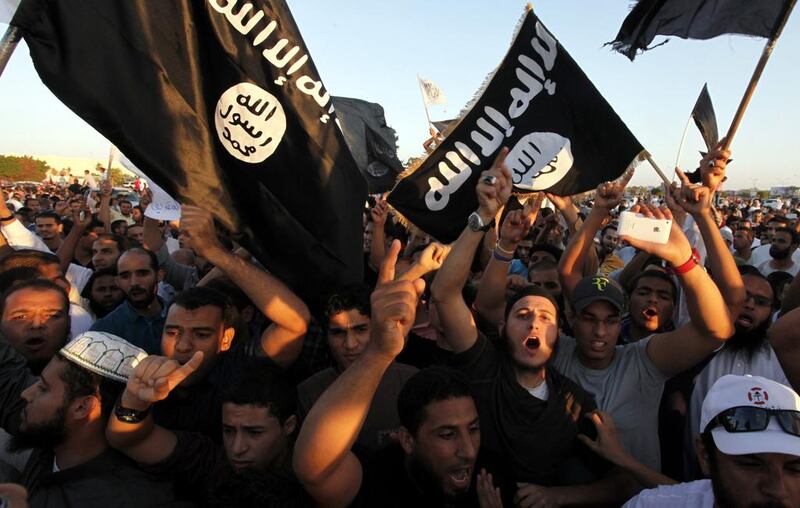CAIRO // On a chilly night, bearded militants gathered at a stage strung with colourful lights in Darna, a Mediterranean coastal city long notorious as Libya’s centre for radical militants.
With a roaring chant, they pledged their allegiance to the leader of ISIL – Abu Bakr Al Baghdadi.
With that meeting 10 days ago, the militants dragged Darna into becoming the first city outside of Iraq and Syria to join the “caliphate” announced by the extremist group.
Already, the city has seen religious courts ordering killings in public, floggings of residents accused of violating Shariah, as well as enforced segregation of male and female students. Opponents of the militants have gone into hiding or fled, terrorised by a string of slayings aimed at silencing them.
The takeover of the city, some 1,600 kilometres from the nearest territory controlled by ISIL, offers a revealing look into how the group is able to exploit local conditions.
A new ISIL “emir” now leads the city, identified as Mohammed Abdullah, a little-known Yemeni militant sent from Syria known by his nom de guerre Abu Al Baraa Al Azdi, according to local activists and a former militant from Darna.
A number of leading ISIL militants came to the city from Iraq and Syria earlier this year and within a few months, united most of Darna’s multiple but long-divided extremist factions.
They paved the way by killing any rivals, including other militants, according to activists, former city council members and a former militant.
Darna may become a model for the group to try to expand elsewhere. In Lebanon, army troops recently captured a number of militants believed to be planning to seize several villages in the north and proclaim them part of the “caliphate”.
Around the region, a few militant groups have pledged allegiance to Al Baghdadi. But none hold cohesive territory like those in Darna do.
The vow of allegiance in Darna gives the ISIL a foothold in Libya, whose central government control has collapsed in the chaos that followed the 2011 removal and death of longtime dictator Muammar Qaddafi.
Extremists made Darna their stronghold in the 1980s and 1990s during an insurgency against Qaddafi.
Darna was the main source of Libyan militants and suicide bombers for the insurgency in Iraq after the US-led invasion. Entire brigades of Darna natives fight in Syria’s civil war.
This spring, a number of Libyan militants with the ISIL group returned home to Darna. The returnees formed a new faction that began rallying other local militants to join the group. In September, Al Azdi arrived.
Many of Darna’s militants joined, though some did not. Part of Ansar Al Shariah, one of the country’s most powerful Islamic factions, joined while another part rejected it.
Meanwhile, a militant campaign of killings in Darna targeted the liberal activists who once led sit-ins against them, as well as lawyers and judges. Militants also stormed polling stations, and stopped voting in Darna during nationwide elections in March and June.
In July, a former liberal legislator in Darna, Farieha Al Berkawi, was gunned down in broad daylight. Her killing was a setback for the anti-militant movement, said a close friend of Al Berkawi. “People had done their best [to force out militants] and got nothing but more bloodshed,” she said.
With opposition silenced, militant factions first came together on October 5 and decided to pledge allegiance to Al Baghdadi and form the ISIL’s “Barqa province”, using a traditional name for eastern Libya. After the gathering, more than 60 pickup trucks filled with fighters cruised through the city in a victory parade.
Last week, a second gathering saw even more factions make a formal pledge of allegiance. Al Azdi attended the event, according to the former militant.
Now, government buildings in Darna are “Islamic State” (ISIL) offices, according to the activists. Cars carrying the logo of the “Islamic police” roam the city.
Women increasingly wear ultraconservative face veils. Masked men have flogged young men caught drinking alcohol.
.
New “Islamic police” flyers order clothing stores to cover their mannequins and not display “scandalous women’s clothes that cause sedition”.
Opposition to the militants is under threat. During the extremists’ first meeting, a witness recounted how Osama Al Mansouri, a lecturer at Darna’s fine arts college, asked the bearded men: “What do you want? What are you after?”
Two days later, gunmen shot Al Mansouri dead.
* Associated Press





